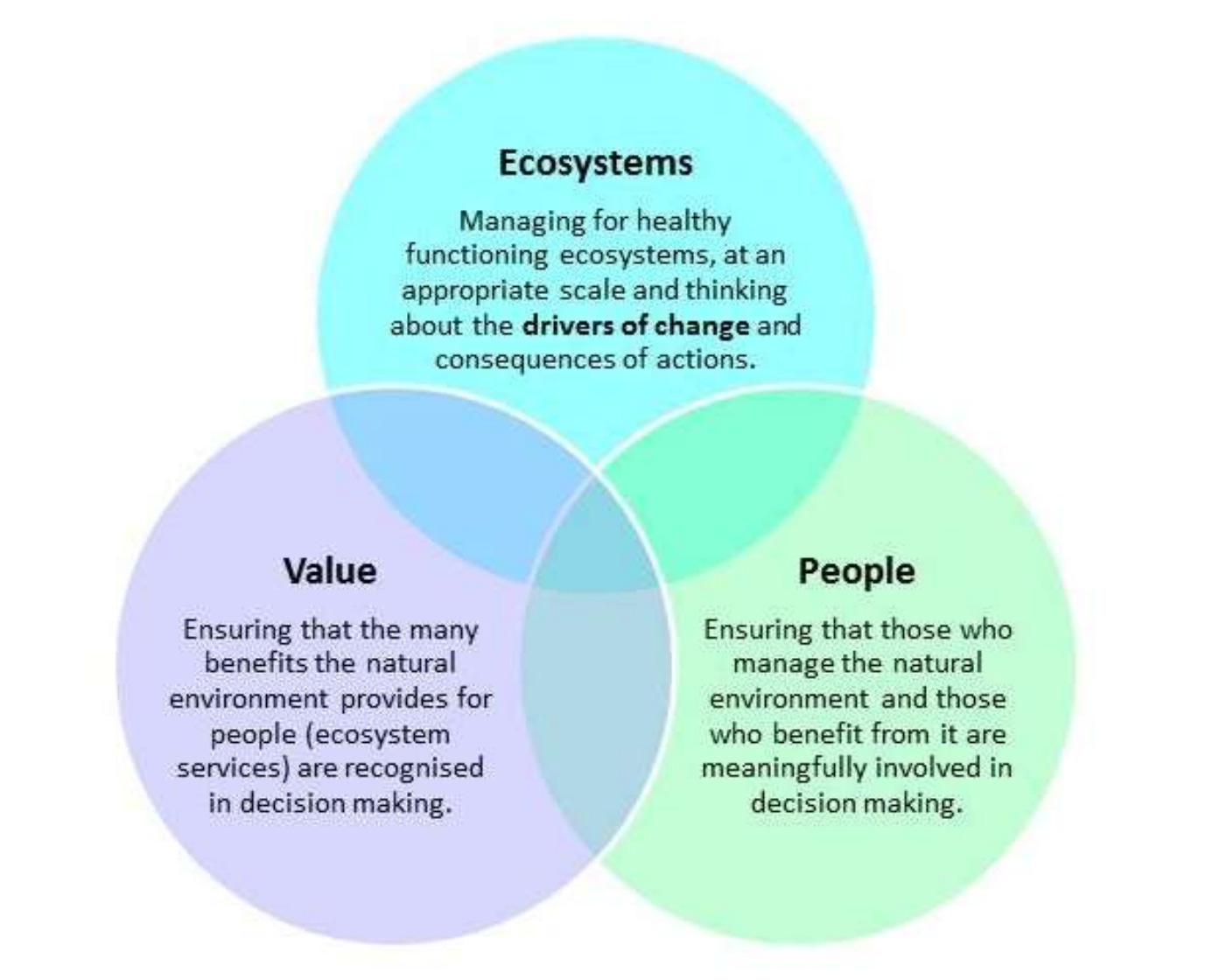The Ecosystem Approach
It took me months to fully decipher the Manhattan Principles, aka One Health. Primarily because individual principles are heavily encoded with the typical, grossly intellectually dishonest doublespeak we’ve come to love so much during the scamdemic. And deciphering is often a matter of locating an obscure paragraph in a 40 year old document, unlocking your comprehension. In my case, I detailed this process only recently, in the World Charter for Nature article.
No, the 12 principles of the Ecosystem Approach pushed by the Convention on Biological Diversity are in fact quite a lot easier to comprehend - and thus, it should quickly dawn upon you that a more appropriate title would be the Eco-Fascist Approach.
The World Charter for Nature article can be found here -
The World Charter for Nature
A phrase in Manhattan Principle 6 with which I really have struggled - ‘ Seek opportunities to fully integrate biodiversity conservation perspectives and human needs (including those related to domestic animal health) when developing solutions to infectious disease threats
Before diving into this, I want you to first understand the organisational structure proposed. It’s a typical hierarchical pyramid, seen below -
Every peasant will have a manager - a knight - who in turn will be ruled by a baron. And this chain continues all the way up the hierarchy, finally reaching the king.
Now, the peasant lives on a plot of land. However, he, by himself, is not a stakeholder in said. The knight is, along with the baron, again eventually reaching the king. The peasants however - call them the ‘indigenous peoples’ - will be pooled together, and combined, they also will be a stakeholder.
In other words, this is no democracy. Powers are vastly transferred up the chain.
And his process even carries on; a baron will control all the plots controlled by his knights, making for an even larger combined plot, meaning that even the knight can be cut out of the decision making process, should he prove to be an inconvenience. All the central powers have to do is delegate up the chain for whatever reason fabricated through ‘the best available science’. It’s principle 2 below.
Oh, I completely forgot to tell you about ‘the science’. Yes, that too is a stakeholder in its own right, but you can rest assured there will be an enforcement mechanism to ensure you stick to ‘the best available science’- or else you’ll get fired, much like what happened to doctors during the scamdemic.
Consequently, with this enforcement mechanism, real power has in effect been transferred to those who manufacture ‘the best science’. And as it’s practically an impossibility to possess perfect knowledge in a system as complex as nature, what you’ll tend to do is exercise your ritual and hope for the best - which in this case is to promote biodiversity, for sakes of ecosystem health.
In other words, as you tend to act on imperfect knowledge, ‘the science’ is your new religion. Who controls said is actually in charge.
-
Now, let’s find out exactly the kind of crime scene these 12 'principles’ are -
Principle 1 states that every patch of land is managed by society. And who’s society? Why, the stakeholders, of course. While ‘indigenous peoples and other local communities’ (that would be you, peasant) should be ‘recognised’, ultimately, management decisions will come from above.
Principle 2 is bad. Because, though decentralisation in general is good from the perspective of liberty, the key word ‘appropriate’ in short dictates that someone will decide what is appropriate. And who will that be? Why, the stakeholders, of course. And the closer to the ‘ecosystem’ management is, the more responsibility is enshrined. This translates to hierarchical placement - except, as we shall later see, these principles are packed full of get-out clauses.
Principle 3 is another ripe for abuse through interpretation. Because who dictates when an activity has affected a neighbour, or a different ecosystem? And that’s where ‘the science’ once again will rule over you - and there won’t be an appeals court.
Principle 4 can be summed up as ‘centralisation is good’, and ‘pray to your god for biodiversity’. The mention of ‘the greatest threat to biological diversity lies in its replacement by alternative systems of land use‘ is a reminder that anything that sacrifices biodiversity can and will be used against you. So don’t do any of that. Just stick to your ritual.
Principle 5 is quasi-religious. This idea that somehow, even if there was some magic ratio for every pair of biota, that you could ever even hope to maintain the same, nor even understand in the context of a reflexive environment - not counting weather differential, or even precise path of poop-dropping migratory birds. A single bear going on a rampage could easily be sufficient to impact these ratios, never mind a pack of wolves. It’s utter lunacy - and don’t even start with the ‘within a threshold’ argument - because who stipules said? Why, ‘the science’, of course. These ratios are absolutely impossible to know, never mind forward predict. And all of this ties into…
Principle 6 stats off by suggesting that we speak of the ratios discussed above. However, it follows up, stating ‘attention should be given to the environmental conditions that limit natural productivity, ecosystem structure, functioning and diversity‘ - in other words, in this context ‘limit’ means fails to reach peak outcome, an insanity indirectly acknowledged through ‘may be affected to different degrees by temporary, unpredictable of artificially maintained conditions and, accordingly, management should be appropriately cautious‘. In other words, some ideologically appointed ‘judge’ using the ‘best available science’ will rule over your case. I hope he likes you, or the bribe you’ll be forced to pay.
Principle 7 was where I, on initial read, saw the largest issue. Because ‘appropriate spatial and temporal scales’ in short means decisions need to be sent up the hierarchy, ‘appopriately’. And what exactly constitutes ‘appropriately’, well, leave that for the stakeholders, you smelly prole. It could mean that the baron chooses on Thursdays, unless it rains. However, the principle does in fact enlighten later on, stating ‘the ecosystem approach is based upon the hierarchical nature of biological diversity‘. Why? Because the key word ‘hierarchical’ in effect means that the ‘ecosystem approach’ ultimately sends power up the hierarchy. It’s undemocratic, in short.
Principle 8 is about prioritising long term outcomes out short. Again, this can be very hard to predict.
Principle 9 is the worst of the lot - and it’s not even a close call. See, for all their claims of acting upon ‘the best available science‘, they ultimately state that nature is unpredictable… but what isn’t is that this get-out clause will only benefit those above you. It completely and utterly absolves them from any genuine issue of liability, and all in the name of ‘the best available science’.
Principle 10 doubles down on this principle, stating that flexibility is necessary when it comes to level of implementation. Of course, the smelly peasant won’t be allowed much ‘flexibility’. You can count on it.
Principle 11 is about monopolising access to information. You create an organisation, controlling the flow of information - INFOTERRA, for instance - which discards inconvenient information, regardless of whether it’s factual or not.
Principle 12 outlines who should be involved in the decision making process, throughout the hierarchy. Those on top along with the ‘the science’ will certainly be heard. The garden prole? Lol.
-
This document was put together by the ‘Convention on Biological Diversity‘. Make sure to make a note of that, because this ties right in with the surveillance data produced by GEMS.
No, really.
The EU document to which I refer in the latter half, relates to compliance with said.
No, really.
Michael Gwynne, 1932-2012
UPDATE - added unclassified cables dragging in human health, the Rockefeller Foundation, SCOPE, and Henry Kissinger. - After a long illness, Michael Gwynne died in Nairobi on February 9, 2012. He became the director of the UNEP programme; the Global Environmental Monitoring System
-
And my final comment here is this -
Not long ago, I covered the Baha’i sect (or call it a religion). Their organisational structure appears almost identical.
And that is probably no mistake.











https://www.pmo.gov.sg/Newsroom/dpm-tharman-shanmugaratnam-joint-opening-ceremony-world-cities-summit
There is also much potential in the ASEAN Smart Cities Network, or ASCN, that we launched earlier this year. It is a collaborative platform of 26 ASEAN cities which are working towards the common goal of smart and sustainable urban development.
Developing community engagement and initiative
Beyond making the most of technology, it is also critical that we empower communities and develop the social capital that helps ensure that urban innovations have broadly felt benefits.
Utah has a "one health" program, it may be of interest to you. https://archive.ph/n0f7V and https://epi.utah.gov/onehealth/
https://www.cdc.gov/onehealth/